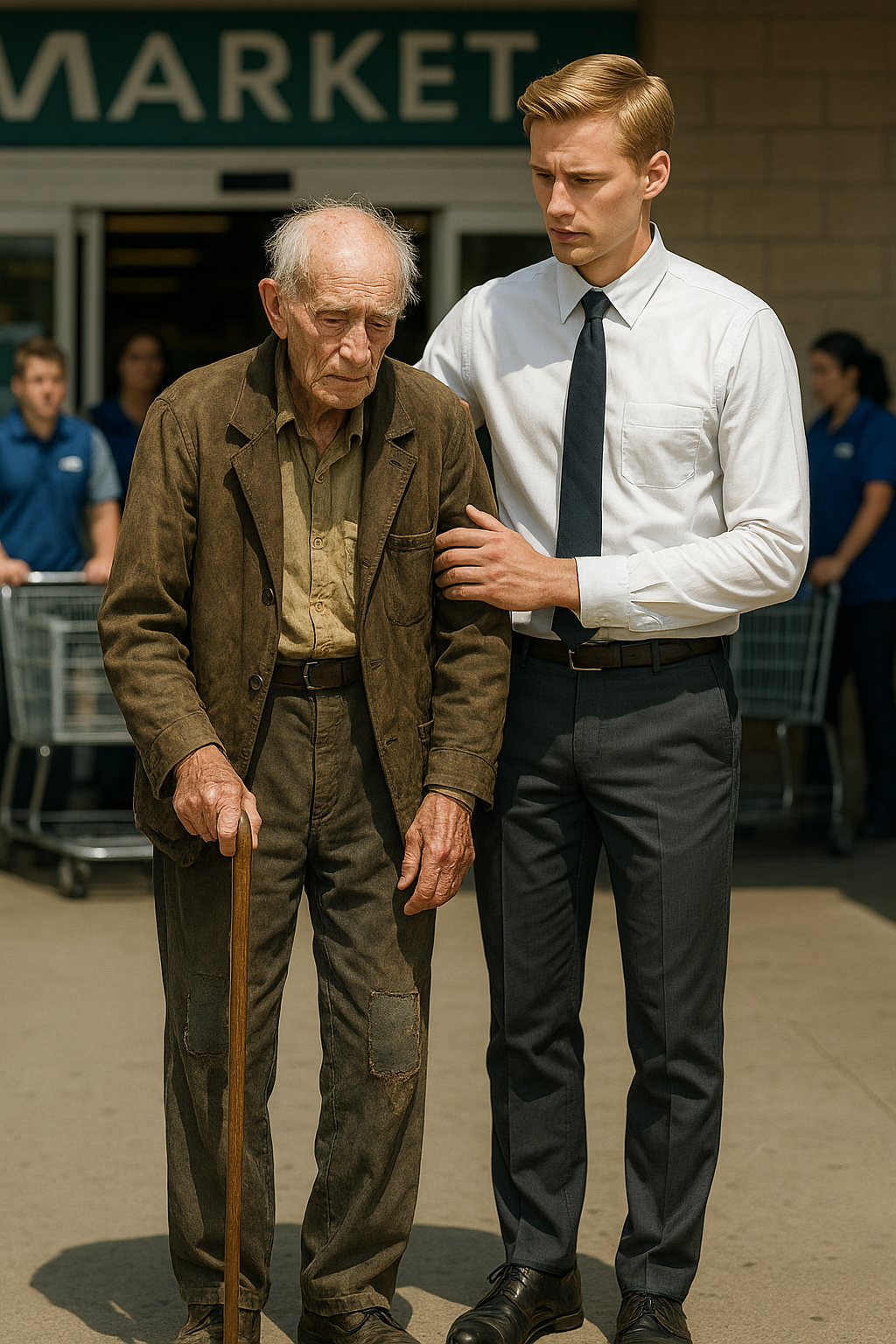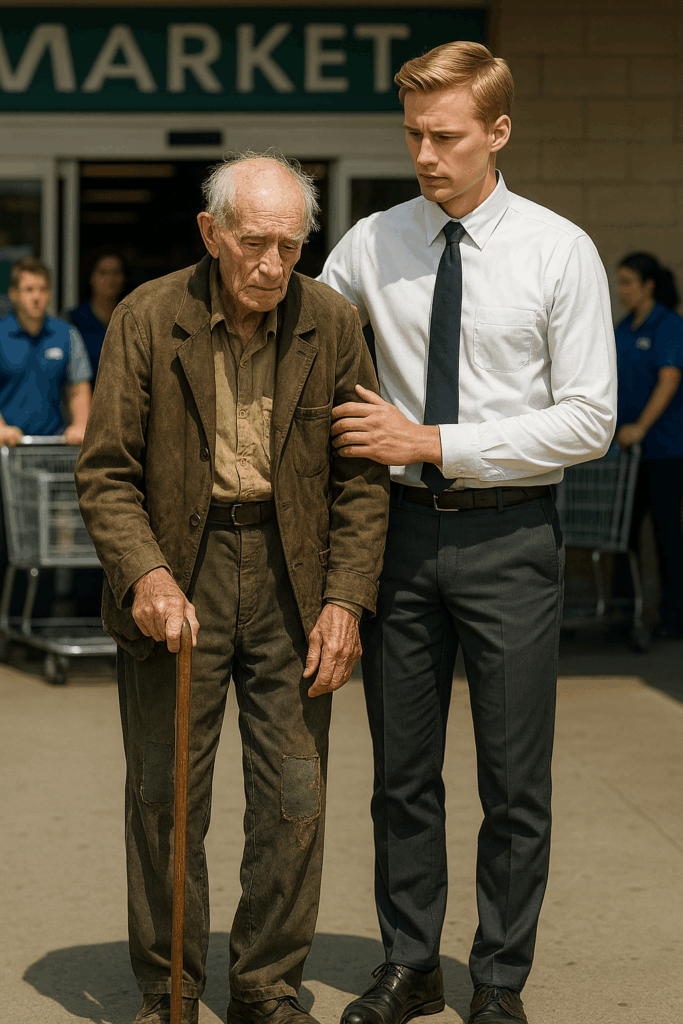At Ninety, I Walked Into My Own Supermarket Disguised as a Penniless Old Man. What Happened Next Shattered My Faith in People—But Also Revealed the One Truth That Will Define My Legacy.
When you are ninety years old, you stop caring about Forbes lists, plaques, or newspaper headlines. They sit in dusty frames on my office wall, but they don’t fill the silence in the middle of the night.
My name is Edward Lane.
For seventy years, I built Lane’s Market, a grocery empire that started with a single family-run store after I came home from the war. By the time I was eighty-five, we had expanded into four states and employed over thirty thousand people. People called me the “Market King.”
But kings still die alone.
My wife, Alice, passed in 1998. We never had children. My nieces and nephews had drifted away, circling me only when rumors of my estate reached their ears. And as I grew older, the question haunted me: Who will carry this forward?
The board? Ruthless men who cared only for quarterly profit? The lawyers, who saw me as a walking trust fund?
I wanted to leave my legacy to someone who still believed in kindness. Someone who would treat the vulnerable with dignity.
So I devised a plan that would test the heart of my own company.

I stopped shaving for two weeks. I wore an old wool coat with holes in the sleeves. I rubbed ash into my hair, dirt into my fingernails, and wore boots with cracked soles. When I looked in the mirror, I no longer saw Edward Lane, the “Market King.”
I saw a man who looked like he’d been forgotten by the world.
That morning, I walked with a limp into one of my flagship stores—the store I had cut the ribbon for thirty years earlier.
Immediately, eyes followed me.
A mother tugged her child away. “Don’t stare, honey.”
A cashier smirked and whispered to her coworker, “Bet he’s here to steal.”
A man stocking shelves muttered, “Smells like rot.”
Every word landed like a blade.
Then the store manager approached.
Part III – The Manager’s Judgment
“Sir, I’ll have to ask you to leave,” the manager said sharply. His name tag read Mr. Dalton. I knew him well—I’d signed off on his last promotion.
“Leave?” I asked quietly. “I’m not doing anything.”
“You’re making customers uncomfortable,” he snapped. “This isn’t a shelter. We run a business here.”
I lowered my gaze. “I just wanted… some bread.”
Dalton scoffed. “Then go earn it.”
He didn’t recognize me. He didn’t even pause to ask if I was hungry. He simply turned and barked orders to an employee to watch me until I left.
I nearly revealed myself right then. Nearly tore off the mask and reminded him whose name was on his paycheck. But I held back. I wanted to see more.
I shuffled toward the bakery aisle, where I stumbled—partly by accident, partly by design. The crowd parted instantly, murmuring in disgust. But one woman approached me.
She was in her late thirties, with tired eyes and a grocery basket that looked half-empty.
“Are you alright, sir?” she asked gently, kneeling to help me up.
“I don’t have money,” I muttered.
She hesitated, then pulled a loaf of bread from her basket. “Take this. My kids and I will manage. You probably need it more.”
Her kindness nearly undid me. For a moment, I thought maybe humanity still lived in my stores.
But then came the twist.
Later, in the checkout line, a young man with slick hair and a crooked smile approached me. His name tag read Bryce – Assistant Manager.
“Hey, old-timer,” he whispered, leaning close. “Rough day?”
I nodded. “Just hungry.”
He grinned. “Tell you what. You wait outside. I’ll sneak you a bag of groceries. No charge.”
My heart stirred—until I saw the look in his eyes. Not kindness. Calculation.
Sure enough, when he met me outside twenty minutes later, he carried not one bag, but four—packed with premium cuts of meat, wine, and expensive items I hadn’t even asked for.
“Here you go, friend,” Bryce said, winking. “Now, in return… I’ll need a little something from you.”
I frowned. “I told you. I don’t have money.”
“Oh, I don’t mean money.” He smirked. “I mean… your Social Security check. Every month. Easy trade for groceries, right?”
The weight of his scheme sank in. He wasn’t helping me. He was hunting me.
And he thought I was prey.
That night, I couldn’t sleep. The faces played in my mind: the cruel cashier, the cold manager, the kind woman, the predatory assistant manager.
The next morning, I returned to the store in a crisp navy suit, clean-shaven, shoes polished. This time, heads turned for a different reason. Whispers rippled through the aisles.
“Is that—?”
“It’s him. Mr. Lane.”
I called a staff meeting. Every employee gathered in the conference room, confusion written across their faces.
I walked to the front and removed the disguise from my bag: the dirty coat, the scuffed boots, the torn hat.
“Yesterday,” I began, my voice shaking with anger and sadness, “I came into this store looking like a man in need. And most of you failed the simplest test of humanity.”
Dalton, the manager, turned pale. Bryce shifted uncomfortably.
I pointed at Dalton. “You told me to leave. You told me I wasn’t welcome. Mr. Dalton, you are no longer welcome here. You’re fired.”
Gasps filled the room.
Then I turned to Bryce. “And you—offering groceries only to extort a man’s Social Security check? Not only are you fired, but you’ll also be facing charges. The police are already aware.”
Bryce’s smirk vanished.
Finally, I spoke of the woman who gave me her bread. I found her later, invited her to the store. She stood at the back, clutching her purse nervously.
“This woman,” I said, “gave me the only food she had for her children. That is dignity. That is compassion. From today forward, she will never worry about feeding her family again. Her groceries will be free for life.”
Her eyes filled with tears.
That day, I went back to my mansion and rewrote my will. My empire—worth nearly a billion dollars—would not go to executives or shareholders.
Instead, I created the Lane Foundation, dedicated to feeding the hungry, protecting the elderly, and rewarding ordinary acts of kindness.
The board was furious. The lawyers tried to fight me. But it was mine to give, and I had seen enough to know where it belonged.
Now, at ninety, I sit in my chair by the window, watching the sunset.
I know I don’t have many sunsets left. But at least I can leave this world knowing my legacy isn’t just aisles of food and corporate profits.
It’s people like that woman in the bread aisle, who gave when she had little to give.
And it’s a warning to people like Bryce—that greed can rot even the ripest fruit.
So I ask you:
If a stranger walked into your life disguised as someone broken and forgotten, how would you treat them—like a burden, or like a human being?


